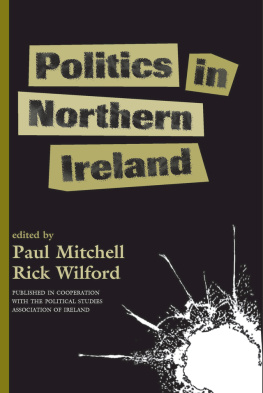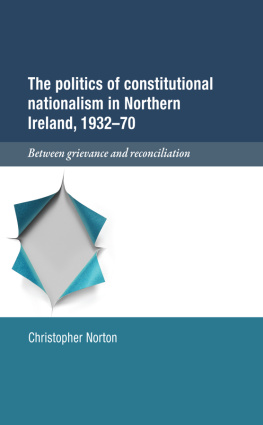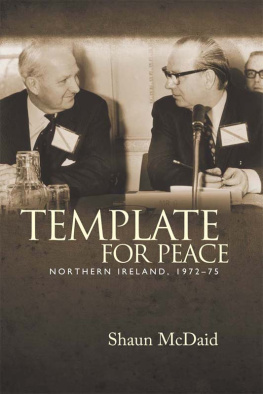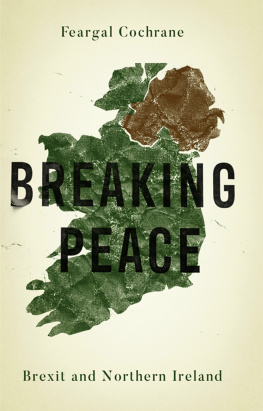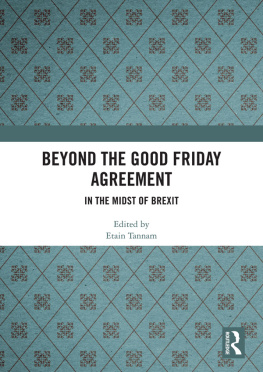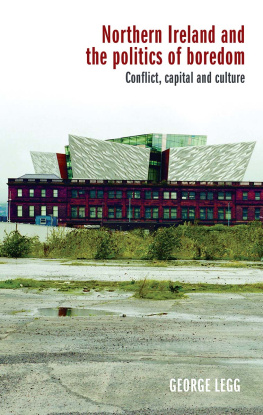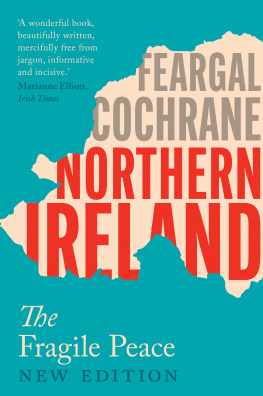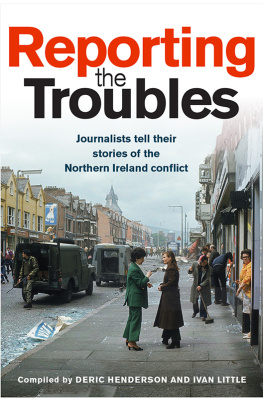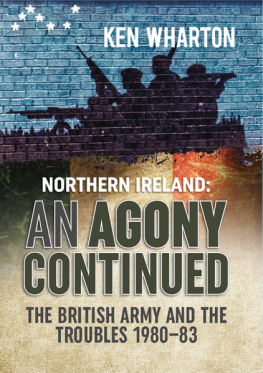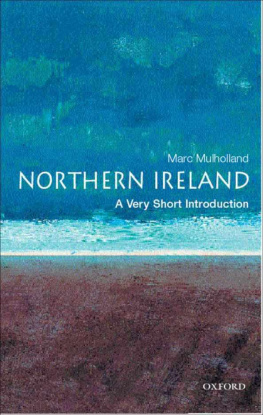Politics in Northern Ireland
Studies in Irish Politics
Michael Marsh, Series Editor
Politics in Northern Ireland,
edited by Paul Mitchell and Rick Wilford
Contesting Politics: Women in Ireland, North and South,
edited by Yvonne Galligan, Eils Ward, and Rick Wilford
FORTHCOMING
How Ireland Voted, 1997, edited by
Michael Marsh and Paul Mitchell
Published in cooperation with
Political Studies Association of Ireland
Politics in Northern Ireland
edited by
Paul Mitchell and
Rick Wilford
The Queen's University of Belfast
Studies in Irish Politics
First published 1999 by Westview Press
Published 2018 by Routledge
711 Third Avenue, New York, NY 10017, USA
2 Park Square, Milton Park, Abingdon, Oxon OX14 4RN
Routledge is an imprint of the Taylor & Francis Group, an informa business
Copyright 1999 Taylor & Francis
All rights reserved. No part of this book may be reprinted or reproduced or utilised in any form or by any electronic, mechanical, or other means, now known or hereafter invented, including photocopying and recording, or in any information storage or retrieval system, without permission in writing from the publishers.
Notice:
Product or corporate names may be trademarks or registered trademarks, and are used only for identification and explanation without intent to infringe.
Library of Congress Cataloging-in-Publication Data
Politics in Northern Ireland / edited by Paul Mitchell and Rick
Wilford
p. cm.
Includes bibliographical references and index.
ISBN 0-8133-3527-2 (hc)ISBN 0-8133-3528-0 (pbk)
1. Northern IrelandPolitics and government. I. Mitchell, Paul.
II. Wilford, Rick, 1947
JN1572.A58P65 1999
320.9416dc21 98-27569
CIP
ISBN 13: 978-0-8133-3528-5 (pbk)
- ALA Anglo-Irish Agreement
- APNI Alliance Party of Northern Ireland
- ASUs Active Service Units
- AV alternative vote
- BIC British-Irish Council
- BSE bovine spongiform encephalitis
- CAP Common Agricultural Policy
- CLMC Combined Loyalist Military Command
- Cmnd. Command
- CSJ Campaign for Social Justice
- DANI Department of Agriculture
- DCA Belfast District Council Area
- DFA Irish Department of Foreign Affairs
- DFP Department of Finance and Personnel
- DH d'hondt
- DUP Democratic Unionist Party
- ECHR European Convention on Human Rights
- EEC European Economic Community
- EOCNI Equal Opportunities Commission for Northern Ireland
- EPA Emergency Provisions Act
- EU European Union
- FEA Fair Employment Agency
- HC Debs. House of Commons Debates
- HMSO Her Majesty's Stationery Office
- ICPC Independent Commission for Police Complaints
- IGC Intergovernmental Conference
- INLA Irish National Liberation Army
- INTERREG A Community Initiative to Assist Border Areas
- IPLO Irish People's Liberation Organisation
- IPP Irish Parliamentary Party
- IPA Irish Republican Army
- LEADER Links Between Actions for the Development of the Rural Economy
- LSq disproportionality
- LVF Loyalist Volunteer Force
- MAFF Ministry for Agriculture, Fisheries, and Food
- MBW Making Belfast Work
- MEP Member of the European Parliament
- MP member of parliament
- NDPBs nondepartmental public bodies
- NI Northern Ireland
- NIASC Northern Ireland Affairs Select Committee
- NICRA Northern Ireland Civil Rights Association
- NICS Northern Ireland Civil Service
- NIEC Northern Ireland Economic Council
- NIFS Northern Ireland Fertility Survey
- NILP Northern Ireland Labour Party
- NIO Northern Ireland Office
- NISA Northern Ireland Social Attitudes
- NIWC Northern Ireland Women's Coalition
- PAF Protestant Action Force
- PAFT Policy Appraisal and Fair Treatment
- PCB Police Complaints Board
- PCC Policy Coordination Committee
- PCLCs Police-Community Liaison Committees
- PD People's Democracy
- PIRA Provisional Irish Republican Army
- PPRU Policy Planning and Research Unit
- PR proportional representation
- PSAI Political Studies Association of Ireland
- PTA Prevention of Terrorism Act
- PUP Progressive Unionist Party
- QUB The Queen's University of Belfast
- RTE Radio Telefs Ereann
- RUC Royal Ulster Constabulary
- SACNI Shared Authority Council of Northern Ireland
- SDLP Social Democratic and Labour Party
- SDP Social Democratic Party
- SF Sinn Fin
- STV single transferable vote
- TD Teachta Dla (Dil Deputy, or member of the Dil)
- TSN Targeting Social Need
- UDA Ulster Defence Association
- UDP Ulster Democratic Party
- UDR Ulster Defence Regiment
- UFF Ulster Freedom Fighters
- UKUP United Kingdom Unionist Party
- UPNI Unionist Party of Northern Ireland
- USC Ulster Special Constabulary
- UUC Ulster Unionist Council
- UUP Ulster Unionist Party
- UUUC United Ulster Unionist Council
- UVF Ulster Volunteer Force
- UWC Ulster Workers' Council
- UWUC Ulster Women's Unionist Council
- VUP Vanguard Unionist Party
- WAC Women's Affairs Committee

Given the sheer volume of books related to the Northern Ireland conflict, it is traditional and appropriate to offer some words of justification for producing yet another. The case is straightforward: Although there are some very good (and a lot of bad) books on Northern Ireland, none of them look much like a text for a course we would design on the politics and government of Northern Ireland. Perhaps understandably, most of the literature concentrates on only a few dimensions of "the conflict" and especially on constitutional policy and the ongoing search for a resolution of the antagonisms. While obviously not wanting to neglect these important topics (several chapters focus on conflict regulation and "solutions"), our feeling was that other important dimensions of politics tend to be relatively overlooked and undervalued. Therefore, in addition to the high drama of constitutional initiatives and negotiations, this book focuses on social structure, the para militaries, electoral and party systems, parliaments, policymaking, policing, and gender. We hope that the result is a well-rounded core text designed for university undergraduates, as well as for a wider public interested in politics in Northern Ireland.
Writing about contemporary politics does, of course, incur risks by threatening to create hostages to both ill and good fortune. However, though sensitive to the unfolding sequence of events, all of the contributors have been careful to embed their chapters within the rich body of scholarship that the study of Northern Ireland has generated. Although the book will appeal to a wider public audience, we have been motivated to cater primarily to the large and growing number of undergraduates attracted to the study of Northern Ireland's politics and for whom the sheer scale of literature is overwhelming. By combining genuine accessibility and considered scholarship, each of the authors helps to navigate students through the complexities of the politics of the region. Northern Ireland may be in the process of political transition. Accordingly, what the book provides, besides an analysis of alternative futures, is a set of guides that describe and explain both the opportunities and constraints that act on the prospects for change, whether they originate within its territory or beyond.

